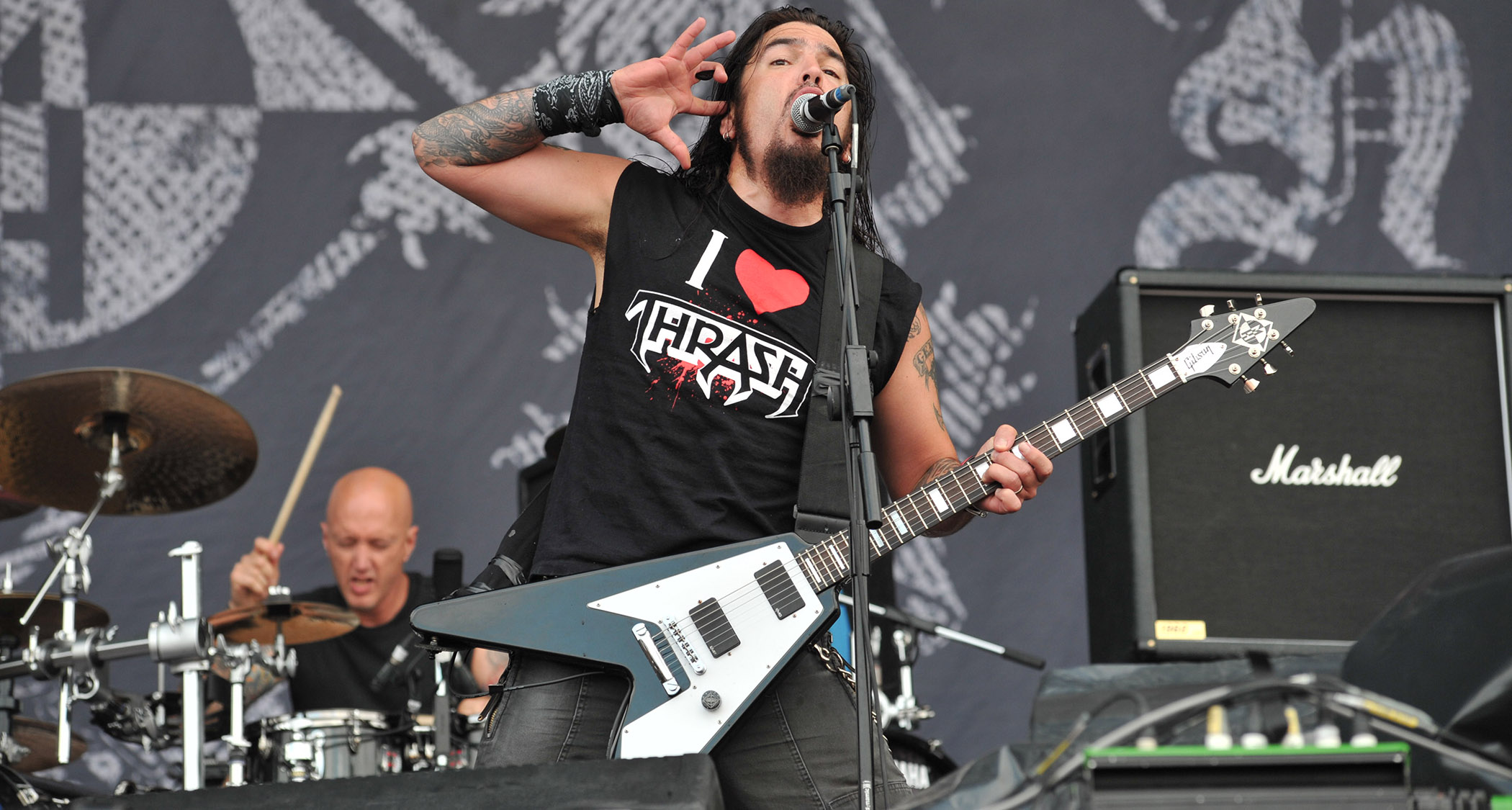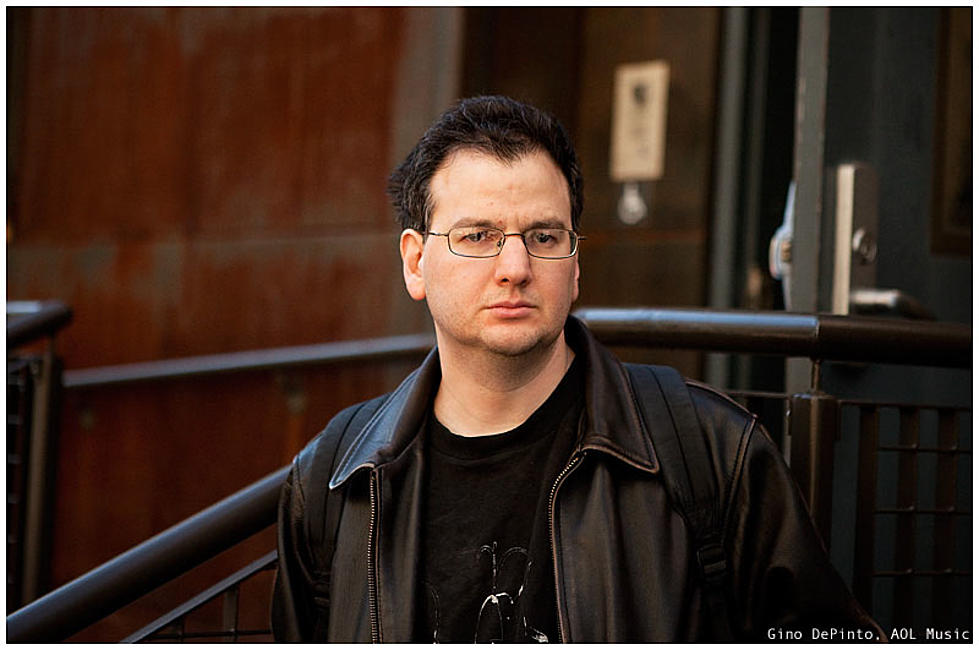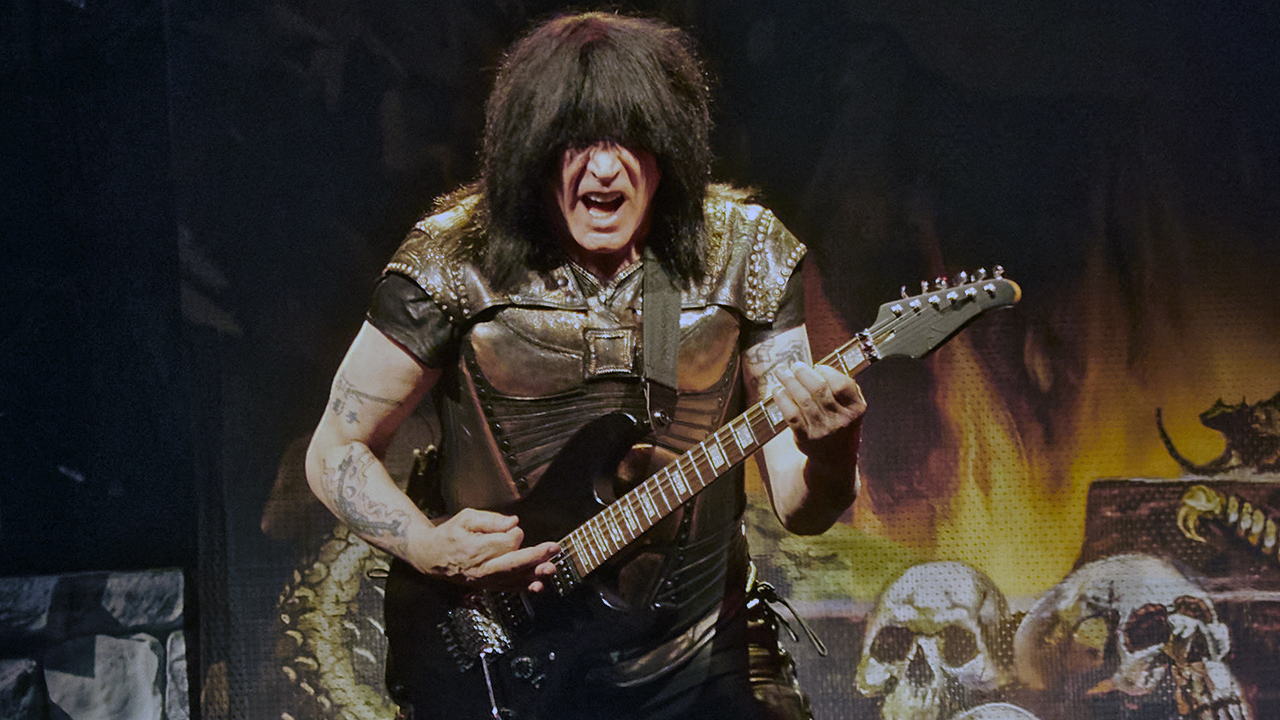“I was 18, strung out on meth and drinking every day. But I’d hear a song I loved by Slayer or Exodus, and it would save my life”: Robb Flynn set out to make Machine Head’s shortest record – but he hopes its four-minute songs will have a lasting impact
Some record exec told Flynn that he'd only last five years, but 30 years on he's still at it, reinventing Machine Head with a new lead guitarist, writing songs to those dark nights of the soul

All the latest guitar news, interviews, lessons, reviews, deals and more, direct to your inbox!
You are now subscribed
Your newsletter sign-up was successful
Bands with 30-plus years of recording and touring behind them are usually in tune with who they are and what they do well.
At that point, the goal is often to give the fans what they want, whether that means releasing albums that tap into the sounds and subjects that’ve benefited them in the past or playing live shows chock-full of hits. Some of these groups don’t feature any original members; others include one or two.
Robb Flynn may be the only founding member in Machine Head, but 10 albums since the band’s scorching 1994 debut Burn My Eyes, he continues to embrace the band’s trademarks: lunging rhythms, speedy thrash riffs in drop-B on his custom baritone guitar, and a tried-and-true blend of squealing pinch harmonics and undulating bends.
On Machine Head’s new album, Unatoned, Flynn defies convention and remains relevant by applying these time-tested elements in new ways, retaining the band’s core sound while experimenting with a range of musical and vocal approaches.
It’s this dedication to constantly evolving that has kept Machine Head at the top of their game musically and commercially.
“I think it really comes down to loving what you do and working hard not to become stagnant,” Flynn says from a desk chair at home in front of one of many authentic pieces of Viking art he and his wife collect. “We don’t come from the typical arc of bands who have been around since the ’90s and have already peaked.
I feel incredibly grateful to the fans that I don’t have to be a jukebox and play for a crowd that’s waiting to hear Davidian and other old songs
“Our last headline dates were the biggest we've ever done. It’s amazing to me that people still love to hear new music from us and I feel incredibly grateful to the fans that I don’t have to be a jukebox and play for a crowd that’s waiting to hear Davidian and other old songs. Those are great, but I can play songs off our newer records and people lose their minds and sing every word.”
All the latest guitar news, interviews, lessons, reviews, deals and more, direct to your inbox!
Heading into Unatoned, Flynn was in the fortunate, yet difficult position of following up one of the band’s most successful records, 2022’s Of Kingdom and Crown. For many fans disappointed by the polarizing alt/nu-metal sounds of 2018’s Catharsis, Of Kingdom... was a welcome comeback.
The songs featured unconventional techniques that inspired fans in the same way as similarly experimental albums, including the epic 2007 album The Blackening and 2011’s even more technically complex Unto the Locust. At the same time, Flynn wasn’t trying to reinvent the past.
“I never considered it a return to form,” he says. “To me, it was just another album of us moving forward and trying new things. We took a lot of big musical risks on that record. Opening the album with a 10-minute-long song, [Slaughter the Martyr], and using a three-minute a cappella vocal intro on [First Blood].
“When I did those, I was thinking to myself, ‘Man, I hope people get this,’ but they did, and that left me in the fortunate position of being able to follow up a record that meant a lot to people.”
Instead of revisiting the angular riffs and expansive arrangements that drove Of Kingdom and Crown, Flynn went into Unatoned determined to write a different kind of album.
“It’s always a challenge to follow up a record that is so beloved by your fanbase because everybody wants you to do the same thing again with new songs,” he says. “So, you just wind up with a shittier version of what you just did. In my experience, you gotta go to a different place, so I put some structures on the songs that would force me to work differently.”
As a songwriter, Flynn followed three strict rules: every track had to be under four minutes long. They all required at least one key change, and the final chorus in every song had to be different than the ones before it.
“Maybe that’s where the key change came in, maybe the drums or guitars drop out during that part,” Flynn says. “It could be anything, but whatever it was, the vocals had to be the same and the music underneath had to feature something different.”

At first, Flynn found it difficult to stick to the new self-imposed mandates – especially the one about keeping the songs under four minutes. But by shortening intros, cutting mid-sections, and keeping the leads tight and concise, he was able to follow the plan. And the more he committed himself to the formula, the more natural it became.
It’s Machine Head’s shortest record – a lean, mean killing machine
“Eventually, it was just a matter of trimming the fat,” he says. “We wound up with 10 songs plus two instrumentals on a 41-minute-long album. It’s Machine Head’s shortest record – a lean, mean killing machine.”
Many of the heaviest songs, including the rapid-fire Atomic Revelations, the surging, tribal Outsider, the scorching These Scars Won’t Define Us, and Unbound (with its slow, queasy string bends) should be instantly familiar to Machine Head.
Then, there are moments when Flynn dips into less metallic waters. Not Long For This World is mid-paced, richly textured, and catchy as hell, Dustmaker is a hazy interstitial driven by spare, simple guitar lines, dizzying keyboards, and a trip-hop beat, and Bleeding Me Dry is a numbing, schizophrenic showcase of squalling harmonics clawing through a bed of electronic drums and sonar samples.
The most unconventional song is Scorn, a gloomy, keyboard-driven elegy that downplays guitar fury in favor of atmospherics and soaring vocals (though the monochromatic riffs provide a bit of kick).
“For the last 15 years, I've been trying to do a Coldplay/Elton John type of piano ballad because Tiny Dancer is a desert island classic,” Flynn says. “I wanted to do something like that, but with a Machine Head twist and heaviness to it. I tried and failed on the last four albums, but this time I collaborated with this [record producer] Joel Wanasek.
“I sent him the chords on guitar because I could hear how I wanted it to sound, but I don’t know how to play that on piano, and he came back to me with this beautiful reimagining of what I wrote. When I heard it back, I was overwhelmed with emotion, because I was like, yes, we nailed it!”
In addition to taking a different approach to songwriting, Flynn strayed further from his comfort zone by shaking up his normal work regimen. For 35 years, he has rarely written riffs on tour. During the tour cycle for Of Kingdom and Crown, however, Flynn carried a guitar everywhere he went and wound up writing parts for Unatoned in various hotels, some of which were in small towns.
“It brought out this very Americana element for me because I wasn’t writing in big city America,” he says. “I grew up in the small town of San Lorenzo, California, which was really worn down and working class. I drove through there recently and it was like time stood still.
“I remembered so many of the houses and they’re exactly the same, except now all the paint is peeling off of them. And the rusted car that was in the front of this one house is now super-rusted and there are tattered American flags on poles in every yard and bars all over the doors and windows. It really brought me back and spoke to me.”

At his current big city house, Flynn also flipped the script, entering his home studio in the wee hours instead of following any type of conventional schedule.
“I have kids so there’s no time during the day when I can get an hour to myself,” he explains, then laughs. “I would get up in the middle of the night, and by 3 a.m. I was wide awake and ready to work.”
Most of the guitar parts for the last two Machine Head albums have been written and tracked at chez Flynn. Not only has it saved the band money, it has maximized the guitarist’s efficiency. Whereas, years ago, when he brought finished demos to the studio to track the final versions of the songs, now he records as he writes and then hands the tracks to Colin Richardson to be mixed.
As long as his co-producer Zach Ohren is awake and available, the recording room is open.
“I’m a big believer in first-take magic,” Flynn says. “You always hear about bands who make a demo that’s amazing, and then they re-record it and it doesn’t capture the same energy. I certainly experienced that with Machine Head back in the day. So now, I just go in and record almost any time I want. By doing that, you end up with a demo which is basically the album.”
That’s not to say Unatoned was done and dusted in a matter of weeks. Flynn worked on some of the songs for up to four months, creating and discarding part after part until the completed cuts spoke to him. Others came much faster. “For Unbound, I wrote one riff after another and a day later, it was finished,” Flynn says. “A few songs that came together really quickly like that.”
Unatoned marks the recording debut for Virginia-based guitarist Reece Scruggs (ex-Havok), who replaced Wacław "Vogg" Kiełtykaon tour in 2022. The Polish guitarist had been with Machine Head since 2019 but left to return to his longtime death metal band Decapitated, whose last album, Anticult, came out in 2017.
“I love Vogg, and I love the songs we collaborated on. We're good friends and we wish him nothing but the best,” Flynn says, adding that he no longer stresses out when bandmates decide to leave or take a hiatus.
“When Machine Head first started, we were a gang,” he explains. “We did everything together and stuck it out through thick and thin. I’m at the stage now where I’m 57 and I’ve learned that, okay, we’re a band that tours hard for a minimum of 20 months.
“That’s a long time, so when people start to fall apart on the road now, I'm not going to make them stay. I'm going to be like, ‘Dude, go home. Take a mental health break. Take care of yourself.’ And if they get to a point where doing this is no longer for them, we’ll figure that out as well.”
Towards the end of the writing session for Unatoned, Flynn flew in Reece to record his leads. While the two guitarists have a similar approach to rhythms, Reece’s solos are flashier and more complex that Flynn’s, providing a striking contrast.
“His right hand is devastating and his choice of notes is incredible,” Flynn says. “He can do all that crazy arpeggio with the finger tap style that’s a whole level above what I can do. I’m not even going to try it. I’ve got my own thing. I'm doing me, but it's really cool to have Reece in the band and he’s one of the best players I've ever jammed with.”
Having persevered for more than 30 years with various lineups, Flynn is grateful that he still has the creative vision to record diverse, but complimentary albums.
I’d hear a song I loved by Slayer, Exodus or another band, and it would save my life and give me the strength to go on another day
Equally significant is his determination to provide a therapeutic release for those who need it. Sure, he wants to remain a blazing beacon for metal. He also wants to be a life preserver for the drowning.
“I’ll always remember what it was like when I was 18 years old.” he states. “I’m strung out on meth and I'm drinking every day. My dad kicks me out of my house and I'm sleeping on friends’ couches. I’m in a band, but I’m mostly playing warehouses and backyard parties -- just trying to get into clubs and feeling miserable a lot of the time.
“But I’d hear a song I loved by Slayer, Exodus or another band, and it would save my life and give me the strength to go on another day. I'd listen to that song 20 times in a row and it would provide oxygen for my lungs.
“So, when I write songs now, all these years later, I'm not writing for YouTube. I'm not writing for the Spotify Top 10. I'm not writing for my record company or a radio station. I'm writing for that lost 18-year-old kid who needs to hear that song so bad just so he can go on and put one foot in front of the other.”
Flynn understands dark nights of the soul all too well. Even when Machine Head started making traction nationwide, he was desperate, depressed, and living dangerously. He wasn’t anxious to be another rock and roll casualty, he just didn’t see any way around it and had given up any notion of having a lengthy career.
“It’s funny,” he recalls. “I remember there was a bigwig in the music scene, and someone asked him how long he thought I would last. The guy said, ‘Oh, I’d give him five years,’ and he didn’t mean it as a compliment. But when he said that, in my mind I was like, Five years? That’s three more albums. I can’t even fathom lasting that long. And somehow I'm still here.”
- Unatoned is out now via Nuclear Blast.
Jon is an author, journalist, and podcaster who recently wrote and hosted the first 12-episode season of the acclaimed Backstaged: The Devil in Metal, an exclusive from Diversion Podcasts/iHeart. He is also the primary author of the popular Louder Than Hell: The Definitive Oral History of Metal and the sole author of Raising Hell: Backstage Tales From the Lives of Metal Legends. In addition, he co-wrote I'm the Man: The Story of That Guy From Anthrax (with Scott Ian), Ministry: The Lost Gospels According to Al Jourgensen (with Al Jourgensen), and My Riot: Agnostic Front, Grit, Guts & Glory (with Roger Miret). Wiederhorn has worked on staff as an associate editor for Rolling Stone, Executive Editor of Guitar Magazine, and senior writer for MTV News. His work has also appeared in Spin, Entertainment Weekly, Yahoo.com, Revolver, Inked, Loudwire.com and other publications and websites.
You must confirm your public display name before commenting
Please logout and then login again, you will then be prompted to enter your display name.




![Machine Head - Old [OFFICIAL VIDEO] - YouTube](https://img.youtube.com/vi/r2dY8Vv_TFY/maxresdefault.jpg)




